(Beirut) – The African Commission for Human and Peoples’ Rights should act decisively to address the dire, protracted human rights crisis in Egypt following its review of the situation in the country, 22 organizations said today. The commission has found Egypt in breach of numerous articles of the African Charter on Human and Peoples’ Rights but has not adopted a resolution on Egypt since 2015, despite the severe deterioration of Egypt’s human rights situation and the near-complete destruction of civic space.
The African Commission reviewed Egypt’s situation during its 85th session in October 2025, with the Egyptian government presenting a report covering 2019 to 2024. The report included false depictions of the human rights situation in Egypt and a blanket denial of abuses. The commission’s country rapporteur for Egypt also presented a report, which omitted widespread abuses and largely adopted government narratives.
“The Egyptian government painted a rosy picture of the dire human rights crisis in Egypt, while the African Commission’s country rapporteur adopted some of its narratives without scrutiny, dangerously amplifying them,” said Mohamed Lotfy, executive director of the Egyptian Commission for Rights and Freedoms. “These misrepresentations make it all the more important for the commission to robustly address Egypt’s human rights crisis, the worst in decades.”
Flagrant and systematic human rights abuses in Egypt have been well-documented in numerous reports by independent Egyptian and international human rights organizations, United Nations and African human rights mechanisms, and even the government-appointed National Council on Human Rights, the organizations said.
The Egyptian government claimed in its report that it has no detained journalists or prisoners of conscience and that restrictions imposed on independent organizations, such as prohibiting them from conducting and publishing studies without permission, are to ensure “transparency and objectivity.”
In public sessions, the African Commission’s country rapporteur for Egypt rarely raised the acute human rights crisis and allegations of widespread abuses. She asserted that the 2023 presidential elections were held in a “peaceful” and “competitive” environment, contradicting well-documented evidence of repression, prosecutions targeting potential candidates and their family members, and Egypt’s effective criminalization of assembly, expression, and association.
The country rapporteur has asked the government to host an African Commission session in Egypt, without raising any concerns over the pervasive surveillance, security forces abuses, and crackdown on protesters. The repression has long been on display, including during the African Commission’s 2019 session in Sharm El-Sheikh and before and during the UN COP27 climate conference in Egypt in 2022.
In December 2024, the country rapporteur made an unannounced official visit to Egypt, which she described as an “information [familiarization] and advocacy visit.” However, she apparently did not meet with any independent human rights organizations before, during, or after the visit. In May 2025, the rapporteur published a report from the visit, which is no longer available on the commission’s website, repeating government narratives unchallenged, such as that “any person accused in a criminal case is entitled to all the rights stipulated in international conventions, especially the right to defense.” Many international and Egyptian human rights groups have raised concerns regarding the rapporteur’s visit and report publicly and in letters to the African Commission.
In the period covered by the commission’s review, the Egyptian government has adopted a zero-tolerance policy toward dissent, virtually eliminated public space, and effectively criminalized the rights to freedom of speech, assembly, and association. Tens of thousands of activists, journalists, human rights defenders, women’s rights activists, peaceful protesters, labor unionists, and academics have been detained or prosecuted merely for exercising their rights. The government has harassed, detained, and prosecuted family members of critics, including critics living abroad.
Dangerously abusive constitutional amendments introduced in 2019 have severely undermined the independence of the judiciary and the rule of law, and have further inserted the military into public and political life in unprecedented ways. New laws have further undermined basic rights, such as the 2019 law on associations and the 2024 asylum law. The government has failed to meaningfully amend existing abusive laws, such as the 2013 law restricting peaceful assembly, the 2018 cybercrimes law, the 2018 media regulation law, and the 2015 counterterrorism law.
The government has also failed to fulfill socioeconomic rights. Spending on education has effectively been reduced to the lowest level in many years. The government’s budget allocation for health care is well below the constitutional minimum and international benchmarks. Cash assistance programs cover fewer than one-third of those living in or near poverty, even according to official numbers.
The dire human rights crisis in Egypt has warranted four African Commission resolutions since 2013, in which it denounced violations such as the “severe restrictions imposed on journalists and media practitioners and their arbitrary arrest, detention and killing for carrying out their work,” as well as “disregard to regional and international fair trial standards [and] the unlawful imposition of mass death sentences.” The Egyptian government has failed to implement the vast majority of recommendations in these resolutions. International and Egyptian organizations met with several members of the African Commission during its 85th session to raise these human rights concerns. Several commissioners reflected a number of concerns in their public interventions.
Egypt has further failed to implement several final decisions in which the commission found it to be in breach of its obligations under the African Charter on Human and Peoples’ Rights, including three decisions adopted during the period under review since 2019.
The African Commission should take robust, decisive measures to highlight the ongoing human rights crisis in Egypt and protect the rights of Egyptians, the organizations said. It should ensure that the current review and concluding observations include an evidence-based assessment of Egypt’s human rights crisis and issue public statements, urgent appeals, and letters to the government raising systematic abuses and the need to repeal and amend abusive laws.
In light of the government’s failure to implement the commission’s previous resolutions on Egypt, it should issue a new resolution calling for investigations of abuses, accountability, and reparations for victims. The African Commission should also establish a follow-up mechanism under its Rule 112 to monitor Egypt’s implementation of recommendations and to engage with victims, civil society, and the state on concrete remedial actions. The commission, through its Working Group on Communications, must urgently address Egypt’s failure to implement remedies ordered in final decisions on individual cases and refer the matter to the African Union Executive Council.
It should use its early-warning mandate under Article 58 of the African Charter on Human and Peoples’ Rights to draw the African Union Peace and Security Council’s attention to the deteriorating human rights situation in Egypt, particularly the risk of mass violations linked to impunity in detention and counterterrorism operations.
The African Commission should publicly commit to monitoring and speaking out about any such threats or restrictions. It should ensure that any country visit includes sufficient consultation with victims of abuses and Egyptian and international human rights organizations as well as credible government guarantees of confidentiality and safety for all those involved.
In case there is a bid to hold a session in Egypt, the African Commission should require the government to offer concrete guarantees that it would uphold and protect the safety and freedoms of all participants and the media. Participants must be able to freely enter the country, and the government must not create adverse consequences or retaliate for any involvement with the session. Critical Egyptian organizations must be allowed access without intimidation or reprisals.
“The African Commission has plenty of tools it can use to highlight and address the dire human rights situation in Egypt and ongoing flagrant abuses,” said Amr Magdi, senior Middle East and North Africa researcher at Human Rights Watch. “At the very least, the commission should ensure that the government narrative is properly scrutinized.”
Signatories:
- Cairo Institute for Human Rights Studies
- Committee for Justice
- Democracy for the Arab World Now (DAWN)
- Egyptian Commission for Rights and Freedoms
- Egyptian Front for Human Rights
- Egyptian Human Rights Forum (EHRF)
- Egyptian Initiative for Personal Rights (EIPR)
- EgyptWide for Human Rights
- El Nadim Center
- Euromed Rights Network
- Hraak for Change and Youth Empowerment
- Human Rights Watch
- HuMENA for Human Rights and Civic Engagement
- International Federation for Human Rights (FIDH), in the framework of the Observatory for the Protection of Human Rights Defenders
- International-Lawyers.Org
- Law and Democracy Support Foundation e.V. (LDSF)
- Ligue tunisienne des droits de l’homme
- REDRESS
- Refugees Platform in Egypt – RPE
- Sinai Foundation for Human Rights
- Their Right – To Defend Prisoners of Conscience
- World Organisation Against Torture (OMCT), in the framework of the Observatory for the Protection of Human Rights Defenders



